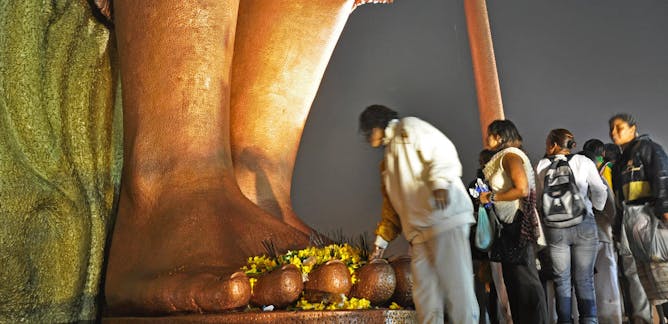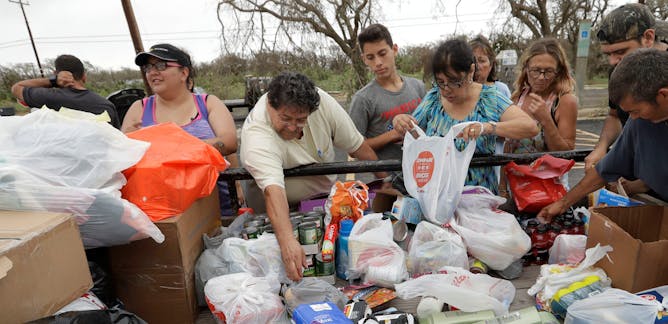|
|
|
Editor's note
|
|
It’s not often that we’re able to get the staff of The Conversation together in person, but yesterday and today our Boston newsroom has been humming with colleagues from Atlanta, New York, Seattle and Washington, D.C. in town for two days of brainstorming and bonding. We’re excited to be talking about the future potential of our unique scholar-journalist collaboration. That also means that we’ve been away from our desks and our computers. So instead of your usual newsletter, here are some of our “greatest hits” among readers from the past four years. Enjoy – and we’ll be back to regular service tomorrow.
|
Maria Balinska
Editor and Co-CEO
|

|
|
Top story
|

Bundles of joy.
Family via www.shutterstock.com.
Matthew D. Johnson, Binghamton University, State University of New York
Fall in love, have a baby, watch your happiness and satisfaction plummet. Psychology researchers know the transition to parenthood can be rough on relationships.
|
Arts + Culture
|

Sarah Diefendorf, University of Washington
Men might not wear purity rings, but some are pledging abstinence, too.
| |

Jean Twenge, San Diego State University
According to a new analysis, the number of US teens who felt "useless" and "joyless" grew 33 percent between 2010 and 2015, and there was a 23 percent increase in suicide attempts.
|
|
|
Health + Medicine
|

Paul Dawson, Clemson University
A food scientist explains the nitty gritty of the five-second rule.
| |

Tammy Chang, University of Michigan; Angie Wang, University of Michigan
Losing weight is hard enough to do without myths interfering in the process. Information based on evidence, not legend, is important. Doctors aren't enough. Friends, family, media need to be on board.
|
|
|
Politics + Society
|

John Broich, Case Western Reserve University
In the 1920s and early 1930s, American journalists tended to put the ascendant fascists on a normal footing.
| |

Frederic Lemieux, Georgetown University
In the wake of the tragedy in Las Vegas, a criminologist reviews recent research to dispel common misconceptions about mass shootings.
|
|
|
Science + Technology
|

David Weintraub, Vanderbilt University
Astronomers have found thousands of exoplanets and the hunt is on for life beyond Earth. Once biological neighbors are identified, our planet’s philosophies and religions will need to adapt.
| |

Matt Bertone, North Carolina State University
This Speed Read makes the case why you should be nice to spiders you encounter in your home and consider a live-and-let-live policy.
|
|
|
Education
|

Ronald W. Pies, Tufts University
Senator Ted Cruz recently stated that he spanks his five-year-old daughter for lying. Spanking kids can cause tremendous damage to kids' mental health – even if it is an occasional light rap.
| |

Christopher P. Brown, University of Texas at Austin
Kindergarteners are under tremendous pressure – doing as many as 15 academic activities in a day, with a shorter recess time. What is the long-term impact?
|
|
|
Environment + Energy
|

Richard G. "Bugs" Stevens, University of Connecticut
The American Medical Association (AMA) issued guidelines for communities to reduce harmful effects of LED streetlights. A medical researcher explains what can go wrong.
| |

Richard B. Rood, University of Michigan
If you're always above average, it's probably time to redefine what's normal. The new normal for Earth's climate is systematically rising temperatures.
|
|
|
Ethics + Religion
|

Dimitris Xygalatas, University of Connecticut
The world's major religions are concerned about moral behavior. What is the relationship between religious commitment and morality?
| |

Alexis Elder, University of Minnesota Duluth
The combination of a divisive political climate and widespread use of social media networks to share controversial material has many people asking this question. Here's what Aristotle would say.
|
|
|
Economy + Business
|

David Campbell, Binghamton University, State University of New York
The desire to help during emergencies like Hurricane Harvey is admirable. With a little homework, your contributions will go further.
| |

Jason Steffen, Northwestern University
Hordes swarm the gate. Bags crowd the aisles. There has to be a better way to board planes. Well, yes, there is. And it’s scientifically proven.
|
|
|
| |
| |
| |
| |
| |
| |
|
|
|
|
|
|
|